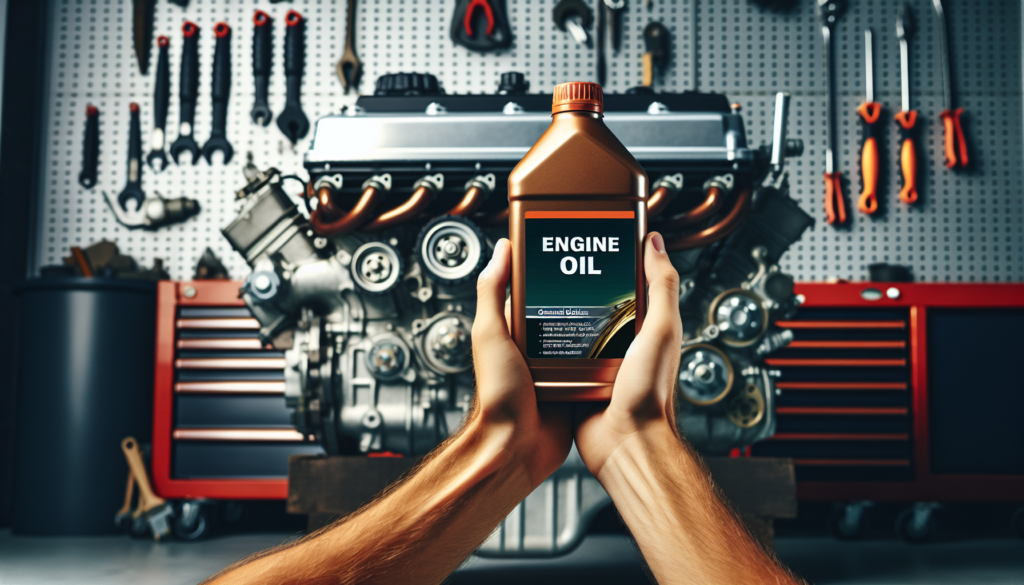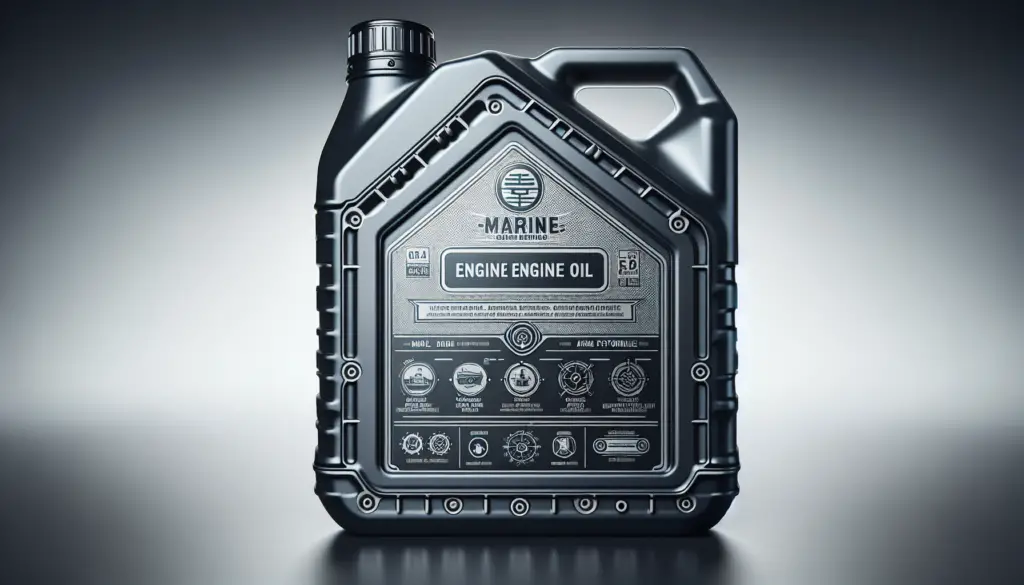Navigating the world of boat engine oil can feel like being adrift on a vast, confusing sea. “How to Choose the Right Boat Engine Oil for Optimal Performance” is here to throw you a lifeline. This comprehensive guide shines a light on the intricacies of different types of oil, how they affect the performance of your boat, and most importantly, how to make the ideal choice for your specific needs. Say goodbye to uncertainty and set sail for a smoother, more efficient boating journey.

Understanding the Importance of Boat Engine Oil
You might be wondering, “Why is boat engine oil such a big deal?” Well, it plays an extremely important role in the overall performance of your watercraft. Without it, your boat simply won’t run as smoothly as it should.
The Role of Engine Oil in Boat Performance
Think of engine oil as the lifeblood of your boat. It works tirelessly to lubricate, cool, clean, and protect the engine’s internal components from damages caused by heat, friction, and other harsh elements. This not only prevents undue wear and tear but also improves your boat’s horsepower and fuel efficiency. Ultimately, the right engine oil keeps your boat engine running at optimal performance.
Effects of Inadequate or Poor Quality Oil
What happens if you use inadequate or poor quality oil? Let’s just say the consequences aren’t pretty. You face a higher risk of engine damage due to increased friction and heat, leading to expensive repairs. Poor quality oil also doesn’t do a good job of removing contaminants, which can result in the build-up of sludge and, consequently, engine failure. So, investing in quality oil is indeed a wise move.
Importance of Regular Oil Changes
Just like how you regularly change oil in your car, your boat’s engine oil needs periodic changes too. Dirty or degraded oil lacks the efficiency to cool, clean, and protect your engines appropriately. Regular oil change ensures your engine is always topped up with fresh, clean oil, keeping it in peak condition and extending its longevity.
Exploring Different Types of Boat Engine Oil
Did you know there are different types of boat engine oils? Let’s explore each one to give you a clearer understanding of what might work best for your boat.
Mineral-based oils
These are essentially natural crude oil that undergoes minimum refinement. They’re the least expensive but offer sufficient performance for lower horsepower engines that don’t run at high temperatures or speeds.
Semi-synthetic oils
Also known as synthetic blend oils, they’re a mix of mineral oil and synthetic oil. They offer better performance and protection than purely mineral-based oils, making them suitable for a wider range of boat engines.
Full synthetic oils
Top of the range, full synthetic oils are chemically engineered to provide the best protection, especially for high-performance engines that operate under extreme conditions. They’re more expensive but usually worth the investment.
Identifying Boat Engine Specifications and Requirements
Identifying your boat engine’s specifications and requirements is crucial to select the right oil. How can you do this? Let’s find out.
Understanding Your Boat’s Operating Manual
Your boat’s operating manual isn’t just a booklet to be tossed aside. It holds valuable information about your engine specifications and the recommended oil for optimal performance. Take time to go through it.
Highlighting the Importance of Engine Specifications
Different engines have varying specifications and hence different oil requirements. For instance, oil viscosity and additive packages must be compatible with your engine specs. Ignoring these details can lead to poor engine performance or even damage.
Applying Engine Requirements to Oil Selection
Once you understand your engine specs, apply this knowledge to your oil selection. For example, a high-performance boat might need full synthetic oil while a lower power engine may do fine with mineral-based oil. The right choice of oil is instrumental in maintaining your boat’s engine health.
Choosing Oil According to Engine Type
Even the type of engine your boat has can influence the best oil to use. Here’s what you need to know.
Two-stroke Engines and Recommended Oils
Two-stroke engines require oil that can cope with higher temperatures and revs. Therefore, a high-quality semi-synthetic or full synthetic oil would typically be a good choice.
Four-stroke Engines and Recommended Oils
Four-stroke engines operate differently and don’t usually generate as much heat as two-stroke engines. Thus, they can do well with either high-quality mineral-based oils or synthetic oils.
Inboard and Outboard Engines: Differences in Oil Preferences
Inboard engines are similar to car engines and can use the same types of oil. Outboard engines, on the other hand, function differently and require specialized outboard motor oil.

Impact of Water Conditions on Oil Selection
The conditions in which you navigate your boat in also influence your choice of engine oil.
Salt Water vs Fresh Water Boating
Salt water is more corrosive than fresh water. If you’re primarily a saltwater boater, consider using engine oil with better corrosion protection.
Considerations for High-Temperature Operations
High operating temperatures call for oil that can resist thermal breakdown. Synthetic oils are a good choice here.
Special Oil Needs for Cold Water Operations
In cold water conditions, oil should be able to flow easily at low temperatures. Again, synthetic oils would generally be preferred due to their superior flow characteristics.
Impact of Boat Usage on Oil Selection
How you use your boat plays a part in your oil selection. Let’s delve into this.
Oil Choice for High-Speed Boating
Boats used for racing or other high-speed activities need oil that can handle high heat and stress. This is where a high-quality full synthetic oil comes in handy.
Choosing Oil for Recreational Boating
For casual, recreational boating, you might not need the highest performing oil. A good quality semi-synthetic or mineral-based oil should suffice.
Oil for Fishing and Long Voyages
If you’re going on long voyages or fishing trips, you need an oil that offers superior engine protection over long periods. Full synthetic oils would be the preferred choice.

Evaluating Oil Brands and Quality
Not all oil brands and their products are created equal. Here’s what you should be looking for.
Examining Brand Reputation and Reviews
Stick to brands with a solid reputation for quality. Look for reviews online or ask around in your boating community.
Assessing Oil Testing and Certification Marks
Only use oils that have undergone rigorous testing and meet industry standards. Look for certification marks on the product label for assurance of quality.
Price versus Performance: Weighing the Value
Cheaper oils might seem appealing, but consider the overall value. Higher-priced oils could offer better performance and long-term cost savings in terms of engine wear and fuel efficiency.
How to Check and Change Your Boat Engine Oil
Keeping an eye on your oil and changing it regularly is crucial. Here’s how to do it.
Signs that an Oil Change is Needed
Signs of dirty or degraded oil can include dark coloration, a burnt smell, and decreased engine performance. If you notice these, it’s probably time for an oil change.
Steps to Change Your Boat’s Engine Oil
Changing your boat’s oil involves draining the old oil, replacing the oil filter, and then adding new oil. If you’re competent with mechanical tasks, you can do this yourself. Else, it’s best to get it done professionally.
Safe Disposal of Used Boat Engine Oil
Used oil is hazardous and should be disposed of responsibly. Many boating facilities and auto parts stores have oil recycling centers.

Maintaining Optimal Boat Performance
Regular maintenance ensures your boat remains in its best shape.
Routine Check of the Engine Oil Level
Regularly check your boat’s oil level to ensure it’s in the optimal range. Too little or too much can cause engine problems.
Understanding the Oil Pressure Gauge
The oil pressure gauge indicates the pressure of oil circulating within your engine. If it’s too low or too high, there could be an underlying issue.
Scheduled Maintenance and Regular Oil Changes
In addition to regular oil changes, stick to a maintenance schedule. Other activities might include inspecting for leaks, checking for water in the oil, and replacing damaged parts.
Common Mistakes in Oil Selection and Maintenance
Avoid common pitfalls related to your boat’s oil.
Avoiding Incorrect Oil Types
Using the wrong type of oil can harm your engine. Always refer to your boat’s operating manual for the correct oil type.
Overlooking Regular Oil Changes
Don’t prolong oil changes. Overused oil loses its effectiveness, which can lead to engine problems.
Ignorance of Warning Signs of Oil Problems
Pay attention to warning signs such as smoke, oil in the bilge, or decreased engine performance. Act promptly to solve these issues.
There you go! You’re now equipped with all the knowledge you need about choosing the right boat engine oil and keeping your boat at its peak performance. Just remember, the right oil choice goes a long way in maintaining your boat’s health, while regular oil changes and maintenance ensure longer engine life and better performance. Happy boating!


